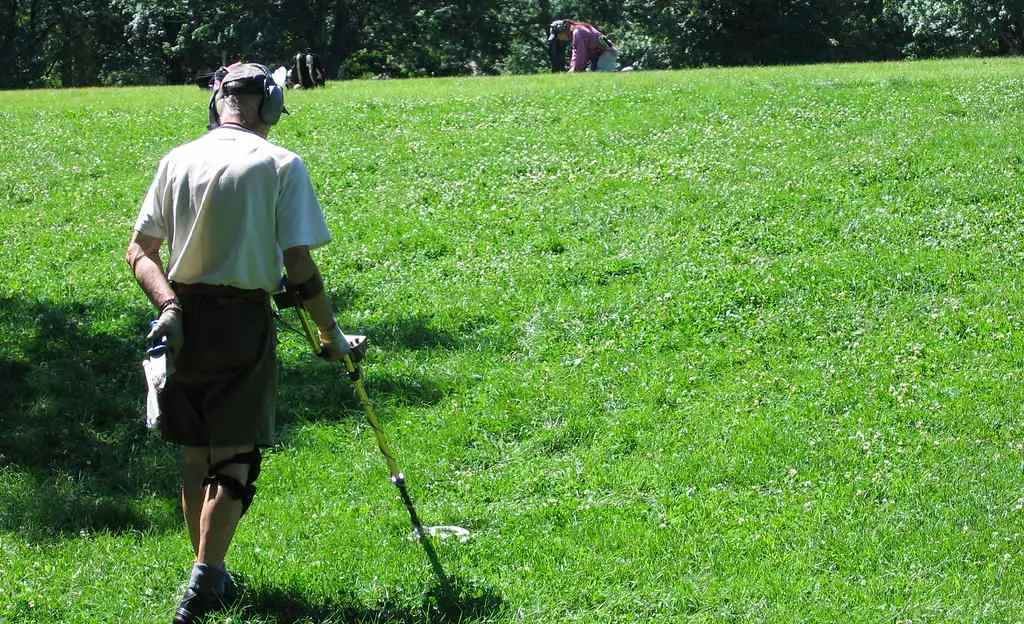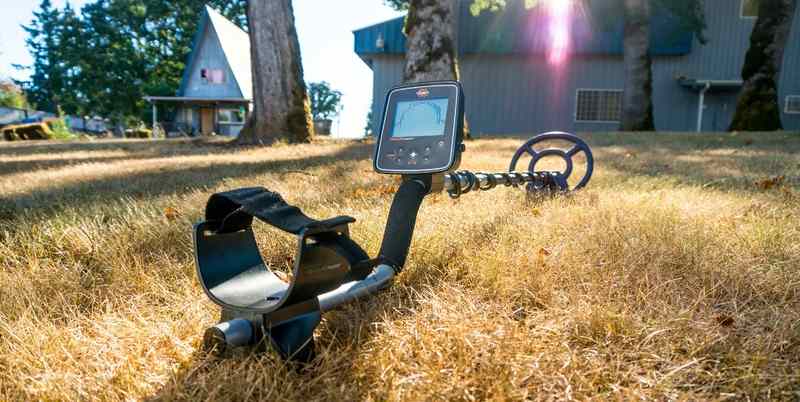
Metal detecting under a wide variety of circumstances across a wide range of geographical features is pretty normal.
In fact, while detecting, it is likely that you will come face to face with many geographical and natural features that may seem impossible to detect through.
This is true for when your metal detector encounters grass, especially if it is tall. The love of being active and outdoors often drawing many detectorists outside and this is where you may encounter a problem of metal detecting in the grass.
In this Post, I list as much helpful tips as possible. Thus, you won’t be intimidated if you are encountering tall grass for example! I also list some machine that will do a better job in such condition …
Metal Detecting in Grass – General Tips
Detecting in the grass could be a bit difficult as many times your machine keeps picking up wrong signals or sometimes does not pick up a signal at all.
Avid detectorists have often reported that while detecting through tall grass when you get closer to the ground, it starts to hinder the detector’s coil sweep.
Below some helpful tips that you might consider:
- Many people simply prefer to cut or mow the grass and continue detecting. But of course, this is not an option if the grassy area is in a public place or on some private property.
- Other detectorists have also advised using a smaller coil or a coil that is closed and smooth on the bottom. It has been observed that the open ones tend to drag on through the grass and weeds.
- However, many hobbyists also simply recommend to give up detecting in the grass since it can damage your equipment. Yet, personally, I don’t agree with that!
- Some people also recommend trying to step on the grass while you walk backward, keeping the coil close to your foot.
- It should be kind of like sliding your foot along. While this is not exactly the best and most comfortable way to detect, but you can also push the coil down a spot to spot, instead of trying to swing it normally as you would with your detector.
Best Metal Detectors for Grass
There are many different types of machines with different costs depending on which type of detector you want to buy.
The terrain on which you plan to be detecting the majority of the time will also play a role in the cost of the detector.
If you plan to detect on grass, then you need a metal detector that will work best there, preferably with a small coil. Let me give you a look at some of the ideal machines in this case:
Garrett Ace 200
The Garrett Ace 200 (You can Check it Here at Amazon!) is one of the most used machines around. It works best across all types of terrains and it is best known for its value performance.
The Ace 200 is also one of the simplest devices to use and can be set up very easily and quickly!
It is also recommended for its ease of assembly and use, its sensitivity to different metals, and also for the ease with which it can detect across terrains.
Garrett Ace 300
Another great Garrett machine, this is a sturdy, lightweight, not that expensive (Check its Current Price Here at Amazon!) and a superb detector for those who frequently detect in the grass.
It is known for the great levels of accuracy for the price range the company sells this model for!
This device is also an attractive option for detecting in the grass as it hardly weighs anything. The new digital target ID of this model offers a range from 0 to 99, providing you a more accurate indication of where your target is as compared to other models.
3. Bounty Hunter Tracker IV
![]()
This is a nice, entry-level, very cheap detector (Check its Current Price Here at Amazon!) ideal for detecting in the grass. This is a great budget machine not just for beginners, but also for younger users.
There are not many settings on the model and the price tag and low weight makes it an attractive model for detecting in the grass.
Metal detecting in Tall Grass – What you should you
Summertime comes with long summer grass. Indeed, detecting through tall grass can prove to be a difficulty even for the most capable detectorists.
The problem in detecting in tall grass is to get near the surface to get the depth. Of course, using a small coil will help as will detecting while the grass is wet.
While in some places, like your backyard, it will be possible to mow down the grass or have it cut, but in public places and other private properties, you will not be able to mow down the grass. Remember the code of ethics …
Detectorists with some experience, though, use a technique with plywood that can help you detect through tall grass in a more efficient way. It involves having a large piece of plywood with a cord tied to it so that you can hold it.
Push the plywood down over the tall grass, essentially flattening it and move your metal detector over the plywood.
It should not be too thick also so that it hampers the signal of your detector. As you detect over the plywood, you can keep moving it across the grass and continue detecting over the plywood itself.
This will save you the process of having to cut down the grass and at the same time, you will be able to continue detecting without any problem.
Some detectorists also recommend using non-motion detectors. These are inexpensive and apparently very helpful if you need to detect over a large area of this type of terrain that includes tall grass.
This option will be more efficient if you already have a prior idea on the location of your target.
Metal detecting in Wet Grass – Helpful Information
Sometimes detecting in wet grass can throw off your detector, though in many cases, detecting in wet grass is also preferred by many hobbyists out there.
If moisture gets inside the coils of the detector, then it can start giving false signals!
One of the important things to keep in mind while detecting in wet grass is to keep a spare coil with you so that you can change the coil and see if you are having coil problems.
Many detectorists believe that wet grass, wet or damp ground helps their metal detector find deeper targets.
Wet grass also helps the detector slide better over it, helping the machine move along smoothly. So water on the grass can either enhance or detract the performance of your metal detector since the water might affect the capacitance of the tuned circuit.
So depending on the amount of water present in the grass and the design of the tuned circuit, water could play a huge role in affecting the performance of your machine.
While in a Double D coil, the design makes it highly unlikely, in a single loop PI, it becomes completely meaningless to try and detect in wet grass.
Learn more about detecting in wet ground!
How to deal with detecting in your backyard?

It might surprise you to know that there could be a wide range of treasure buried in your backyard!
Metal detecting in your backyard can surprise you with a find of cash, jewelry, gold, and even some valuable relics if you are lucky.
Detecting in your backyard is especially a good idea if you are a beginner. This will help you head you practice your long and slow sweeps before you actually head out into unchartered territory.
However, when you detect in your backyard, it is possible that you have to detect in the grass as many people have a grass growing in their backyard.
While it is rare that a well-maintained backyard will have tall grass, in some cases it is possible that you will need to battle through tall grass with your detector to get any signal.
However, since it is your own backyard, you should simply consider cutting or mowing down the grass so that you will be able to detect better.
There are always plenty of opportunities when you drop something and even if you have built a new house, this does not mean that the land was not used earlier.
For all you know, the land on which your house is built on was an old settlement, a building site, or farmland …
… Always remember that the biggest saying in the world of metal detecting is, ‘where there are people, there’s treasure’…
… Thus, do not assume that you will not find anything in your own backyard till you have given it a thorough once over with your detector.
Conclusion
Detecting in Grass is in many cases a big concern for hobbyists for the reasons I’ve list before and especially when it comes to maintaining the proper depth …
… In addition, detecting there is common, that is, sooner or later you will find yourself exploring there. Thus, I’ve chosen to put together this Guide, hopefully you will learn how to deal with it in a proper way.
Finally, if you are looking to learn more about detection in similar conditions! Then you definitely should have a profound look at this fields detecting Guide! You will learn a ton of valuable information …
